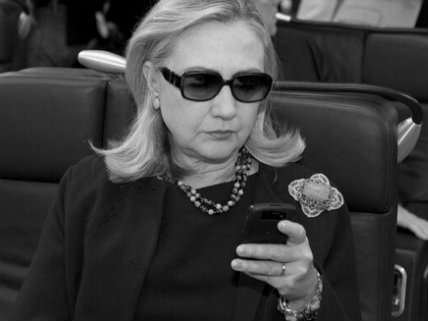Hillary Clinton's Question-Dodging Response to the Private Email Scandal
Clinton's behavior shows that her only priority is herself.

Yesterday, a photographer for the celebrity gossip site TMZ became the first reporter to ask Hillary Clinton on camera about her unusual, exclusive use of a personal, privately run email address while serving as Secretary of State. The photog bungled the wording of the question, asking, "With the blunder of the emails, was that just a generalization gap or can that be corrected?" Clinton just walked by.
It wouldn't have mattered if the question was worded a little bit better, though. Clinton has no plans to answer questions about the emails any time soon.
According to a Bloomberg Politics report by Jennifer Epstein, Clinton's plan is to avoid any in-depth discussion of the scandal for the time being, and instead refer questions to State, and to a Tweet from Wednesday night, in which she said, "I want the public to see my email. I asked State to release them. They said they will review them for release as soon as possible."
The tweet itself was artfully disingenuous: Why run email through a privately controlled system except to hide your communications from the public? And while it's true that the Department of State is now reviewing thousands of pages of her emails for possible public disclosure, the review only covers emails that Clinton aides hand-picked and turned over. She's already edited the archive. She demonstrably does not want the public to see the rest.
Meanwhile, there are a lot of questions Clinton should be answering.
For example: How does she square her use of private email with State Department policy directing that work be conducted on an authorized, secure email system? As Politico reports, since 2005 the State Department has had a "clear cut" policy in its Foreign Affairs Manual that "general policy that normal day-to-day operations be conducted on an authorized [Automated Information System], which has the proper level of security control to provide nonrepudiation, authentication and encryption, to ensure confidentiality, integrity, and availability of the resident information."
A representative from State told Politico that the policy only applies to the transmission of sensitive information. That doesn't put Clinton in the clear, though. White House Press Secretary Josh Earnest admitted Wednesday that "there is a substantial amount of sensitive information that is included in her email."
Proper email use wasn't laughed off during Clinton's time at State: In 2012, an Ambassador to Kenya was pushed out in part for using his personal Gmail account, unconnected to the official State Department email system. Why was it okay for her to do the same thing? (Other documents indicate that under Clinton, State employees were specifically instructed not to use private emails.)
And then there are the security risks. The agency policy stresses the importance of maintaining secure communications, but Clinton's use of a homebrew email system raises serious questions about how secure it really was.
For Democrats, meanwhile, the story should raise other questions about the individual who is, despite not having officially announced a campaign, the party's presumptive 2016 presidential nominee. Clinton's team has reportedly known about the issue since at least last August, according to Politico. And yet not only did she choose to let it sit until after the mid-term election, almost certainly making it a bigger issue in the run-up to her expected campaign, she seems to have given Democratic allies no warning or way to respond.
The story, and the way it has rolled out, illustrates the risks of an all-in bet on a single candidate. And it's revealing about how Hillary Clinton operates: She wasn't concerned about the security of high-value communications in the administration she worked for; she wasn't concerned about the policies and procedures of the department she oversaw; and she wasn't concerned about the political preparedness of the rest of her party when the scandal broke. Instead, she was concerned about herself.
Given Clinton's history of secrecy and distrust of public scrutiny, it seems more than likely that her primary goal in setting up and relying exclusively on the private email setup was to create an email system that gave her a high level of control over what messages could ever be revealed to the public. That she is now refusing to answer difficult but pertinent questions about her unusual email system is really no surprise: The system itself was created to help her avoid answering uncomfortable questions in the first place.


Show Comments (304)